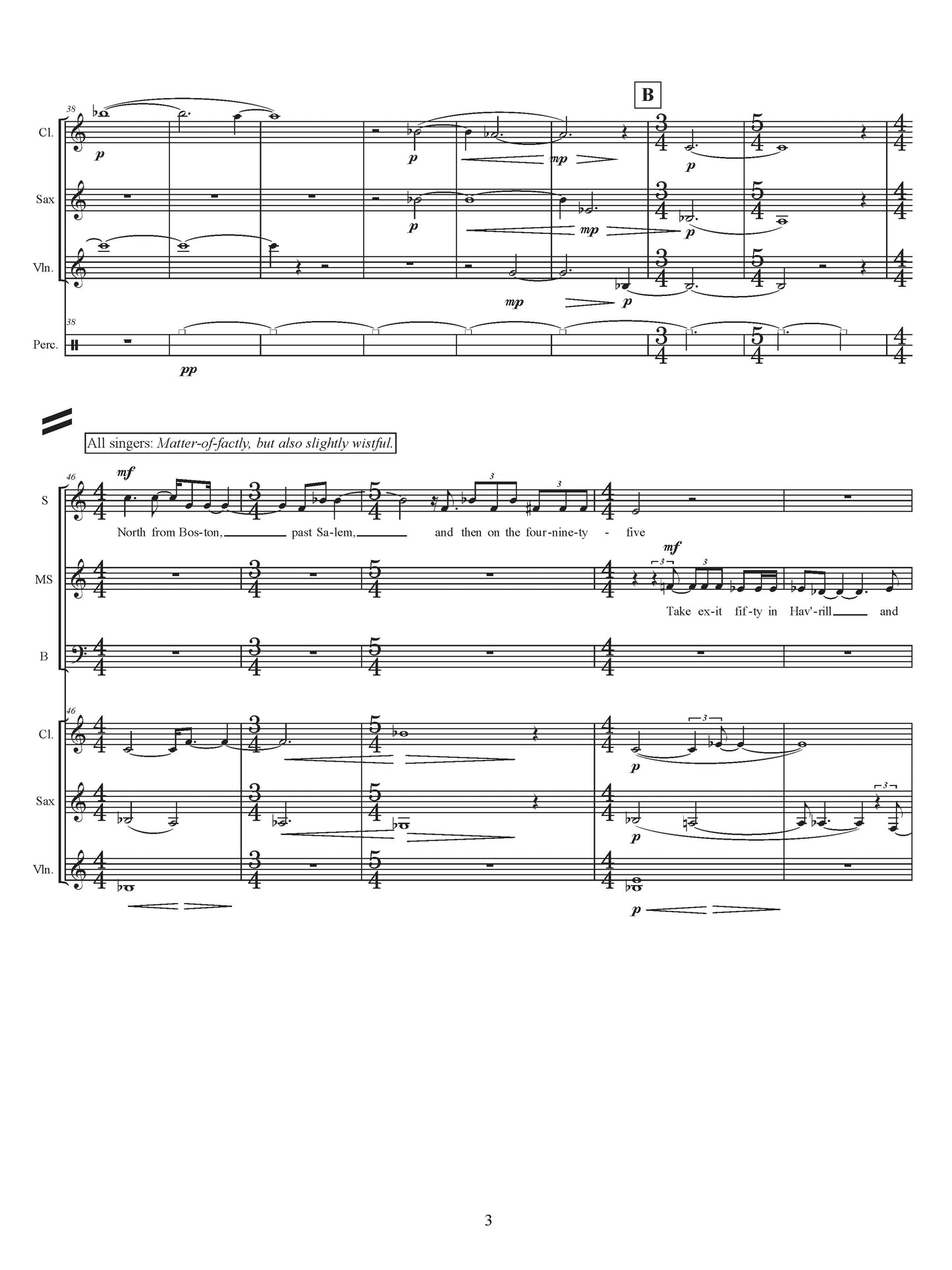Lansing McLoskey » The Captivity of Hannah Duston
The Captivity of Hannah Duston
The Captivity of Hannah Duston
Soprano, Mezzo-Soprano, Tenor, Baritone, Clarinet (Doubling Bass Clarinet), Alto Saxophone, Violin, and Percussion
Composer's Note:
The first American woman to have a public statue erected in her honor was Hannah Duston (1657-c.1737), of Haverhill, Massachusetts. In 1697, during the King William's War, Hannah and her six-day old infant were abducted by Native Americans, and marched some 150 miles to a village on the Merrimack River. Along the way the infant was killed, along with other captives. Roughly a month later Hannah escaped by slaying ten of her captors, fleeing in a canoe back to Haverhill with two others.
No fewer than seven statues and monuments were erected in her honor, and the story of her captivity and escape appeared in nearly all books about American history, biographies, children's books, and magazine articles for over 170 years; especially during the 19th century, when captivity narratives were useful propaganda during the period of westward expansion and ongoing conflict (which many now characterize as genocide) with Native Americans. Hannah was hailed as a heroine into the twentieth century; four of the monuments in her honor were constructed in-between 1902 and 1910.
Over a period of 150 years, some of American's most notable authors retold the story, including Cotton Mather, John Greenleaf Whittier, Nathaniel Hawthorne, Henry David Thoreau, and Sarah Josepha Hale. These accounts differ in details included or omitted, employing Duston as a narrative pawn, much like current broadcast media anchors spin stories to their demographic's political leanings.
And what are these details? Do they make a difference?
Does it make a difference that the ten Native Americans were killed in their sleep? Or that eight of the ten were women and children (two adult women and six children)? Or that at Hannah's suggestion, after initially fleeing in a canoe, she and the two others returned to the scene, where they scalped the dead? Does it make a difference that there was a lucrative bounty for Indian scalps, which Hannah collected? Does it make a difference that the particular Abenaki tribe who kidnapped Hannah had been converted to Catholicism by the French, and practiced daily Christian prayers? In contrast to being depicted as pagans/heathens?
Does it matter that other details of Hannah's account are disputed, if not unlikely? Does it matter that most of the numerous paintings and accounts of the story in the 19th century were partially sanitized by not depicting or mentioning the women or six children that Duston killed?
Does it make a difference that several of the statues & memorials to Hannah have been stolen, defaced, or vandalized in recent decades? Should we be surprised?
Of course details -- and context -- matter, and even among the authors used in this opera their perspectives of the story and views/judgements of Hannah differ greatly.
One thing is beyond dispute: The story is complicated, and raises many ethical questions. Who is the Good Guy? The Bad Guy? Can we -- or should we -- even attempt to simplify the story to such a black-and-white narrative?
The Captivity of Hannah Duston seeks not to provide answers or to point fingers. Amidst a current social backdrop of the nation wrestling with its monuments and troubled histories, this event from 323 years ago is apropos for us, here and now. The various accounts and perspectives call into question absolute notions of history and truth, and provoke a reassessment of national heroes and their stories.
But it's not just about assessing/reassessing the past; it's about how we as a society tell -- and understand -- news and stories when we turn on the TV, Facebook, Twitter, radio, or read a magazine or newspaper.
It's complicated.
Movements: Prologue, Part I: From Cotton Mather, Part II: From John Greenleaf Whittier, Part III: From Nathaniel Hawthorne, Part IV: From Henry David Thoreau, Part V: From Sarah Josepha Hale, Epilogue
Authored (or revised): 2022
Text source: Libretto by Glen Nelson, based on captivity narratives about Hannah Duston by Cotton Mather, John Greenleaf Whittier, Nathaniel Hawthorne, Henry David Thoreau, and Sarah Josepha Hale.
Duration (minutes): 112.0
First performance: Guerilla Opera, TBA
Book format: full score
SKU
ACA-MCLA-029cSubtotal
$160.00Couldn't load pickup availability














